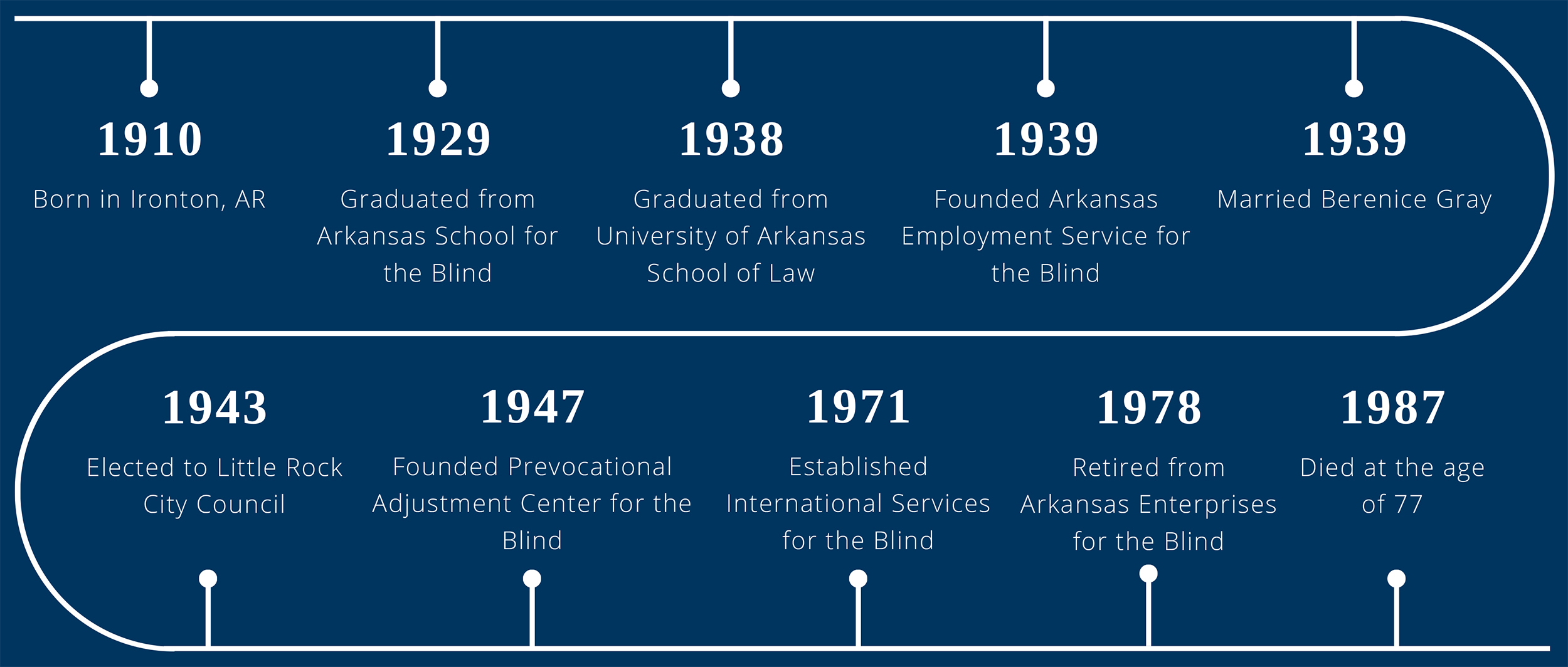LEARN MORE
Roy Kumpe, Founder
⠠⠗⠕⠽ ⠠⠅⠥⠍⠏⠑⠂ ⠠⠋⠕⠥⠝⠙⠑⠗
Roy Kumpe was a giant at the heart of Little Rock. From founding World Services for the Blind, serving on the Little Rock city government, and leading numerous professional organizations, Kumpe left his mark not only on the city but on the international blind community as well.
By: Kaye Lundgren
Early Life
Roy Franklin Kumpe was born on January 18, 1910, to Dave Franklin Kumpe (1884-1951) and Mary Ester Emmaline Pritchard Kumpe (1883-1954). He was the second oldest of six children. Kumpe was born on a truck farm outside of Ironton, Arkansas, where his father raised livestock, fruit, and vegetables and his mother managed the home and assisted with farm chores.
As an eight-year-old child, Kumpe contracted an eye infection from one of his visiting cousins. The eye infection turned into Trachoma, a bacterial infection that scars the cornea, and Kumpe began to lose his sight.
In the fall of 1918, his parents enrolled him in the Arkansas School for the Blind, at that time located at 18th and Center Streets in Little Rock. Due to a serious bout with the flu, Kumpe was pulled from school, but he re-enrolled in February 1919 and resumed his third-grade classes. In 1929, he graduated as valedictorian of his class.
Timeline

Political Aspirations
Empowered by his secondary education, Kumpe continued his education at Little Rock Junior College, with the goal of becoming a lawyer. At age twelve, he noticed that lawyers often entered the field of politics. Kumpe, too, wanted to be a politician, and at age sixteen, he supported young gubernatorial candidate Brooks Hays. Hays was an attorney, a politician, and a Baptist layman, and these various roles in one candidate greatly appealed to the young idealist Kumpe. Such role models inspired Kumpe to overcome tuition hurdles during the Great Depression (1929-1939), and he graduated with a law degree in 1938 from the University of Arkansas School of Law.
After obtaining his law degree, Kumpe turned his attention to politics. In 1938, he ran for State Senate and lost. But in 1943, he won a seat on the Little Rock City Council and served until 1948. He then served an eight-year term with the Little Rock Planning Commission.
In 1939, Kumpe met his future wife, Berenice Gray, while consulting with Municipal Judge Harper Harb on a legal question. Gray worked as a secretary at Harb’s office. That same year, Kumpe and Gray were married over the Thanksgiving holiday. The couple had three children: Chad, Jerre, and Peter.
Founding the Center
With the passage of the Randolph-Sheppard Act by the U.S. Congress in 1936, blind individuals were given employment opportunities operating vending stands in federal buildings throughout the country. Kumpe supervised the vending stand program in Arkansas and found blind individuals to run the stands. However, Kumpe soon realized the blind operators needed additional training in order for them to become fully independent. In 1947, he and the Lions Clubs of Arkansas created the Prevocational Adjustment Center for the Adult Blind. This center provided the life and vocational skills necessary for obtaining a job. The center’s name later changed to Arkansas Enterprises for the Blind Rehabilitation Center (AEB).
Awards and Professional Organizations
Though Kumpe was not elected to state government office, he accepted positions within professional organizations. He served as president of the American Association of Workers for the Blind from 1951 to 1953. In the mid-1950s, he was a board member of the American Foundation for the Blind (AFB). He established the International Services for the Blind in 1971, and he was the founder-president of the National Council of Rehabilitation Centers for the Blind in 1972. In 1981, Governor Frank White appointed him to the Board of Trustees of the Arkansas School for the Blind. This appointment was notable because it fulfilled one of Kumpe’s teenage aspirations. As a high school senior at the Arkansas School for the Blind, he knew he wanted to one day serve on the school board.
In addition to distinguished appointments, Kumpe received many awards, including the Migel Medal from AFB, the Shotwell Award from the American Association of Workers for the Blind, the Meritorious Service Award from the Southwest Region of the National Rehabilitation Association, and the Lions International Ambassador of Goodwill and Humanitarian Award. Kumpe also received an honorary Doctorate of Law degree from the University of Arkansas (UA) in Fayetteville in 1973.
Awards Received
- American Foundation for the Blind — Migel Medal
- American Association of Workers for the Blind — Shotwell Award
- Dialogue magazine — Founders Award
- Southwest Region of the National Rehabilitation Association — Meritorious Service Award
- American Council of the Blind — Ambassador Award
- People-to-People committee for the Handicapped — Marion Mill Preminger Medallion
- Lions International Ambassador of Goodwill and Humanitarian Award
- Little Rock Junior College Alumnus of the Year Award
- Little Rock Jaycees — Boss of the Year
- Arkansas Democrat — Little Rockian of the Year
- University of Arkansas at Fayetteville — Honorary Doctorate of Law Degree
Retirement
In 1978 Kumpe retired, and Governor David Pryor declared February 5 as a day to honor him. Reflecting on his life, Kumpe commented that the Lions Club was an integral part of him as it provided him with both a social outlet and an opportunity to engage in community service. Between the Lions Club and his church, he remained busy during his retirement years.
On September 13, 1987, Kumpe died and was buried at Roselawn Cemetery in Little Rock.
Sources
Dickerson, Larry R., and Larry Morgan. “World Services for the Blind.” Encyclopedia of Arkansas. Central Arkansas Library System. Last modified January 25, 2022. https://encyclopediaofarkansas.net/entries/world-services-for-the-blind-4697/.
Find a Grave, “Roy Franklin Kumpe (18 Jan 1910–15 Sep 1987).” Find a Grave Memorial ID 198934310. Accessed June 28, 2022.
Jones, Melanie, and Susy Phillips. “Roy Franklin Kumpe.” Encyclopedia of Arkansas. Central Arkansas Library System. Last modified October 13, 2021. https://encyclopediaofarkansas.net/entries/roy-franklin-kumpe-7574/.
Kumpe, Roy, and Jim Lester. The Lion’s Share: A History of Arkansas Enterprises for the Blind. Little Rock: Rose Publishing Company, 1983.
Tuttle, Dean, and Naom Tuttlei. “Roy Kumpe: Inducted 2002.” Hall of Fame: Leaders and Legends of the Blindness Field. American Printing House for the Blind. Accessed June 28, 2022. https://sites.aph.org/hall/inductees/kumpe/.
About the Author
Kaye Lundgren is an archival assistant at the UA Little Rock Center for Arkansas History and Culture.
